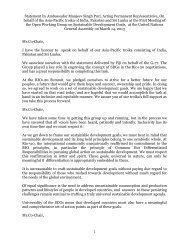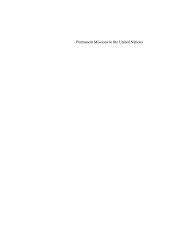STATE OF THE WORLD'S CITIES 2012/2013 Prosperity
STATE OF THE WORLD'S CITIES 2012/2013 Prosperity
STATE OF THE WORLD'S CITIES 2012/2013 Prosperity
You also want an ePaper? Increase the reach of your titles
YUMPU automatically turns print PDFs into web optimized ePapers that Google loves.
institutions and grassroots leaders collaborating on<br />
community outreach schemes, and various programmes<br />
involving the citizenry in the ‘sustainable’ agenda. The city-<br />
State’s ‘compact city initiative’ promotes density, facilitates<br />
mass transit and includes a ‘walkable’ campaign. Under<br />
Singapore’s waste management scheme, 58 per cent of solid<br />
wastes are recycled, another 40 per cent incinerated to<br />
produce energy, and the remaining two per cent goes to a<br />
purpose built off-shore sanitary landfill.<br />
<strong>CITIES</strong> IN ARAB <strong>STATE</strong>S<br />
Across Arab States, only one-third of local experts consider<br />
that economic development has unintended detrimental<br />
effects on the environment (Figure 2.5.3). However, this<br />
favourable average conceals sharp differences across<br />
cities. Experts that view that economic development has<br />
negative effects on the environment are an overwhelming<br />
majority in Beirut, and 50 per cent in Kuwait City, Shiraz<br />
and Muharrak in Bahrain. These cities have relatively<br />
large populations (Beirut, Kuwait City and Shiraz) and<br />
intense economic activity. In Beirut, local experts see a<br />
direct link between rapid<br />
urban expansion and<br />
environmental problems,<br />
with one describing the city<br />
Figure 2.5.3<br />
as “a metaphor for brutal<br />
real estate speculation”,<br />
per cent<br />
with attendant noise<br />
90<br />
pollution and traffic<br />
congestion. 17<br />
Similarly in Kuwait<br />
City, local experts point<br />
to the construction boom<br />
associated with economic<br />
growth and urban<br />
expansion. As noted by<br />
one, this double boom has<br />
placed “acute pressures on<br />
road networks, with traffic<br />
becoming a nightmare”. 18<br />
Only very few local<br />
experts in Saida (Lebanon),<br />
Basra and Beirut believe<br />
their respective cities<br />
promote environmental<br />
sustainability as a matter<br />
of policy. In Beirut,<br />
“environmental concerns<br />
80<br />
70<br />
60<br />
50<br />
40<br />
30<br />
20<br />
10<br />
0<br />
Environmental Impact of Growth* – Arab Cities<br />
Beirut<br />
Kuwait City<br />
Muharrak<br />
Shiraz<br />
81<br />
Environmental Sustainability and the <strong>Prosperity</strong> of Cities<br />
are rarely considered”, with an absence of effective policies<br />
for urban planning, although they are needed in areas<br />
like traffic and waste management. 19 However, in Doha,<br />
Aqaba and Dubai, most local experts report that their<br />
respective cities have proper policies in place. In Dubai,<br />
environmental sustainability policies include the Emirates’<br />
Energy and Environment Rating System and the Air<br />
Quality Management System, among other robust policies<br />
and governance mechanisms promoting environmental<br />
sustainability in Qatar’s capital city. 20<br />
LATIN AMERICA AND <strong>THE</strong> CARIBBEAN<br />
Two distinct phenomena may be at play here: the region’s<br />
high rates of urban spatial expansion and relatively high<br />
Amman<br />
POLICy<br />
Basra<br />
* As perceived by local experts surveyed by UN-Habitat<br />
Source: UN-Habitat, City Monitoring Branch, Policy Survey, 2011<br />
The main message from Arab States is that<br />
urbanisation and economic growth are inevitable;<br />
and if matched with appropriate and effective policies and<br />
governance, the environmental consequences are manageable.<br />
Erbil<br />
Dubai<br />
Doha<br />
Aqaba<br />
Saida<br />
All Sampled<br />
Arab Cities



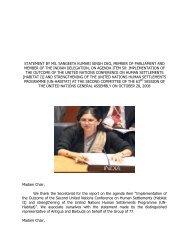
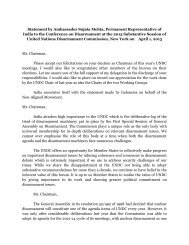
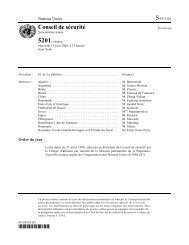
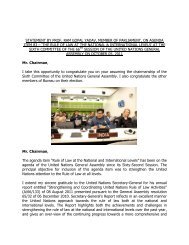
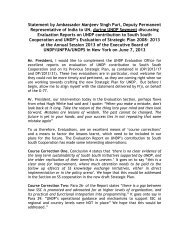
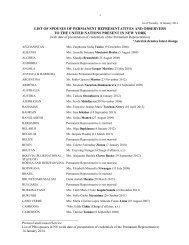
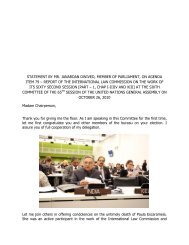
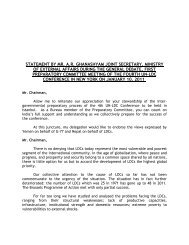
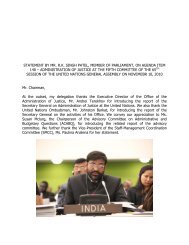
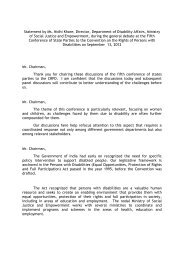
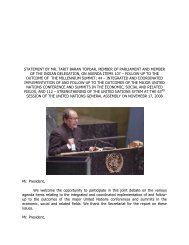
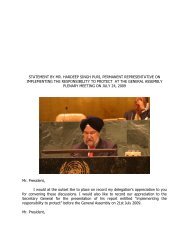
![1 statement by dr.[mrs] kakoli ghosh dastidar - Member States Portal](https://img.yumpu.com/27526598/1/190x245/1-statement-by-drmrs-kakoli-ghosh-dastidar-member-states-portal.jpg?quality=85)
